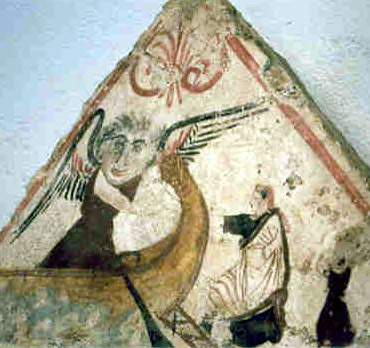 |
 |
Aiakos or Aeacus was born as a son of Zeus and Aegina. Aegina was the daughter of the rivergod Asopus. Zeus took Aegina to the island of Oenone. This island was later named Aegina after this one of Zeus' many loves. Aiakos ruled the island of Aegina as a monarch. Unfortunatly Aiakos' rule suffered when his people were destroyed by a plague. As a monarch he wished that he could rule new subjects. The story goes that Zeus granted his prayers and created new subjects (the ant people) for him. The ant people or the Myrmidons, were people that Zeus had made from the ants. Aiakos was the grandfather of Achilles, and the father of Telamon and Peleus. Aiakos was known as a very pious man, dedicated not only to the gods but to his city. Proof of this is his help in building the walls of Troy with Poseidon and Apollo. Although Aiakos had many distinguished descendants, his presence is not seen as extremely significant. He is probably most often seen in myths concerning the underworld, or Hades, because of his role as a judge. He served as a judge with Rhadamanthys and Minos. (Britannica Online)
|
|
|
|
|
|
|